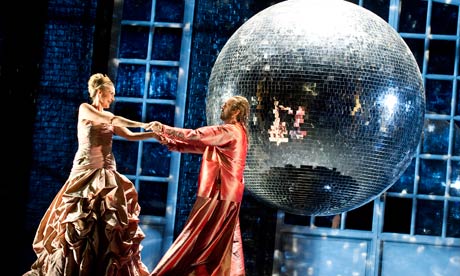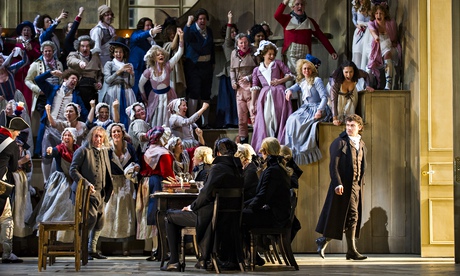Relativity: the opera? It's been done. Philip Glass put Einstein on a beach, and a German opera, C – the speed of light (2005), swirled us around multimedia universes to mark his anniversary year. But there's always another angle, especially when you cast the physicist not as the mad boffin of later years but as a hip-swivelling, woman-ogling celebrity scientist, as he became (a celebrity, that is; I can't verify the hips) so spectacularly, overnight, in 1919.
Will Gregory, who as half of the duo Goldfrapp released a song called "Rocket", of which the last line is "We have lift off", has launched into relative space for his first opera, premiered at the QEH, commissioned by the BBC Concert Orchestra and directed by Jude Kelly. Some may think Piccard in Space remains grounded. One tweeter has called it "catastrophically dreadful" and the worst opera ever seen. To that I would say: you haven't lived. A long list of contenders for this title is available on request.
Piccard relates the epic attempt of a Swiss-Belgian aeronaut-polymath, Auguste Piccard, to test Einstein's theory by going up in a balloon through the earth's atmosphere. Piccard inspired Hergé's cartoon scientist Professor Calculus. He also has a Virgin train named after him – but as "Picard" (sic), presumably for reasons of C-economy. Once you treat the whole enterprise as surreal – think, staying Belgian, of the besuited men floating above rooftops in Magritte's Golconda – it becomes bizarre and quirky, if also a good third too long and dramatically topsy-turvy. A short comic opera, with serious intent and much charm, is trying to get out.
The Newton-Einstein split which transformed physics is played out via a bewigged, arch countertenor – Nicholas Clapton as Newton – who mimics baroque recitative and haunts the action like Mozart's Commendatore. We are given a pukka tutorial on relativity using the two-trains-struck-by-lightning example. We singalong-a-"Time dilation factor" – yes, we the audience; that should be scrapped instantly – and on video projections watch two fat putti write out Newton's second law of motion up above the clouds.
Gregory, who was classically trained and whose mother, the dedicatee, was a Covent Garden opera chorus member, has a fluent style – luscious, tonal and Moog-rich – and a gentle wit about the tics and tropes of opera. A cosmic choir in white overalls (expertly sung) has some Eric Whitacre-like set pieces. Andrew Shore, Robin Tritschler, Leigh Melrose and Mary Plazas gave strong performances to an unexpectedly small audience. No Wainwright Prima Donna red carpet stuff here, though give me Piccard in Space any day. Charles Hazlewood conducted and Michael Vale set it all, simply and cleanly, in Piccard's capsule, which eventually landed in Switzerland.
As a saxophonist, Gregory played in John Adams's Nixon in China, and his score owes much to American minimalism. It's in the Doctor Atomic- lite vein, though the physics (libretto by Hattie Naylor) is more accurate. Courtesy of an elite escort agency my companion was a top theoretical physicist who, as it were, danced with a man who danced with a girl who danced with Albert Einstein. His verdict? Einstein, who had a sense of hilarity, would have loved it. Decide for yourself: it's on Radio 3 on 13 April.
Strauss's Intermezzo (1924), in a new staging by Scottish Opera, brings us crashing back to earth. Its subject is a marital misunderstanding, based on an event in the composer's own happy if tempestuous wedlock. His wife Pauline once opened a love letter sent by a young woman – some bimbo, she – to the wrong man. In the opera, "Christine" files for divorce, while enjoying her own minor dalliance. After detours to a toboggan run and other easy operatic venues, all is forgiven. Anita Bader was a nicely truculent if underpowered Christine, Roland Wood her convincingly dyspeptic husband. Sarah Redgwick's Anna has charm and Nicky Spence shone as a louche young Baron. Wolfgang Quetes directed an amiable, Klimt-styled production. The orchestra, under Francesco Corti, had narrow escapes but saved their fire for the interludes, so turbulent and grand you wonder about Strauss's odd intention. His wife knew nothing until first night. Dinner afterwards must have been memorable.
While Intermezzo rues the habits of marriage, Beethoven's Fidelio celebrates fidelity in the face of peril. The Royal Opera House has revived Jürgen Flimm's staging, not alas a good advert in a week when the company's budget was cut 15%. It looks fine in a dour, rusty-iron way, but is lumbered by props and business, with an uneven cast. But there were glories: Endrik Wottrich's Florestan mustered blood-curdling anguish for his Act 2 dungeon cry. Nina Stemme, not an ideal Leonora but compelling, sang with hallmark ardour. The orchestra, conducted with brisk momentum by Mark Elder, excelled. Beethoven's bachelor dream of married love, squabble-free and transcendent, may contrast with Strauss's brittle actuality. Both work, even if the pure flame only burns brightest when the husband is in solitary confinement.










